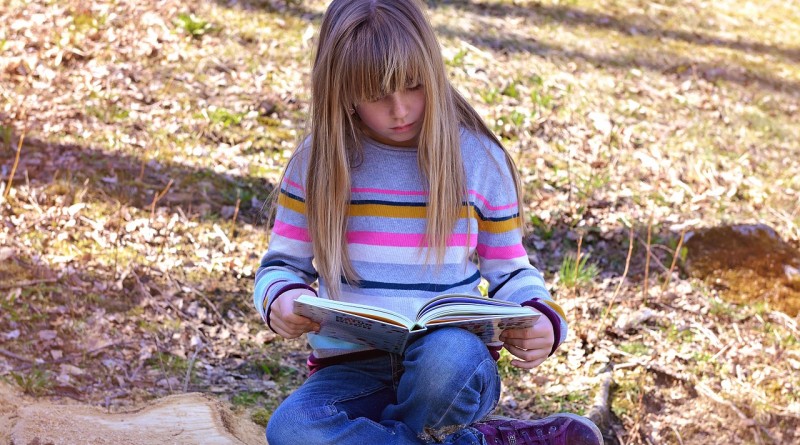How can I get my children reading?
SHORT ANSWER
Start young, read aloud, talk about books, choose exciting and funny books and – when they’re a bit older – encourage your children to try audiobooks.
Scroll to the bottom for our book list.
FULL STORY
Regular reading of fiction is the most enduring and life-enhancing habit anyone can acquire, beating gym membership, five-a-day, mindfulness, yoga and playing a musical instrument by a country mile.
I am not denigrating the above highly commendable activities – but just give your children a love of reading (and get the habit yourself if you haven’t already got it) and you will be giving them lifelong pleasure, empathy, coping skills, breadth of thought and tranquility of mind, better vocabulary and memory, writing skills of their own and – last but definitely not least – you will be introducing them to many brilliant people who (despite being fictional) will stand right beside them as companions for a lifetime.
So how to get the habit?
1: Start Young
All little children love picture books so this part is easy.
Once you progress past the cloth books and the squeaky musical books, the children’s section of any bookshop is an amazing place of inspiration and enjoyment.
No encouragement is required to get your toddler to plunge in, so just one recommendation that you might otherwise miss – the work of Janet and Allan Ahlberg, especially the brilliantly interactive Each Peach Pear Plum.
2: Read Aloud
Reading aloud is an art which now seems to be confined to childhood.
But it is a hugely pleasurable activity at any age and reading aloud to young children is especially good.
People of all ages love listening to stories (what is Eastenders if not a story?) but an early habit of listening to a story without flashing images might open a bigger door.
The real world and that of television are very fast-moving – while listening to the spoken word requires peace and quiet and time.
Everyone has to sit still to listen, which does us all a great deal of good.
Again, there are many fabulous stories for early readers/listeners, but a few recommendations could be Arabel’s Raven by Joan Aiken (about the anarchic raven Mortimer who destroys every household he enters and says only Kwark!), all the Teddy Robinson stories, all the Winnie-the-Pooh stories and Rudyard Kipling’s Just So Stories.
3: Extend The Books Into Real Life
Reading is not a “school subject” and what we find in a book is not confined to the book.
The idea of extending discussions beyond the pages and applying it to real life is brilliantly illustrated at the end of the Sterling Classic edition of Robinson Crusoe.
The publisher adds on a surprising list of questions. For example: “What do you think it would be like to be completely alone for 25 years?” and “Would you leave the safety of your home to go exploring?”
Try this with the books you read to your children.
It’s good fun and encourages deeper thinking.
4: Be brilliantly well-informed about book choices and always go for exciting or funny
I am certain that most of those who say they don’t like reading just don’t know how to choose something to their taste.
They find it easier to watch television, where the choices are already made – which is like being stuck in the violent crime section or the chick lit section of the bookshop.
Even when a good book is brought to the screen, it’s rarely as powerful as the written words and the characters don’t look the way you hoped (Gandalf excepted, he was just right!).

So as your children reach their teens, keep up the habit of reading aloud if you possibly can.
Read to the little ones and the older ones may listen too.
Look at the literary reviews in the weekend issues of The Times and The Guardian – they are full of ideas and inspiration.
It was a newspaper review which switched me on to Philip Pullman’s His Dark Materials, a thrilling read for teenagers.
And at around the ages of 13 to 15, who would not be thrilled by that scene from The Lord Of The Rings when the Nine Riders break out from the trees and chase down the elf-horse as it races Frodo to the ford?
Or by the pirate Israel Hands in Treasure Island as he climbs the rigging towards young Jim Hawkins with a knife in his teeth?
Leaves Emmerdale at the starting gate!
5: Embrace the audio download
I am lucky – the endless procession of children and grandchildren through my household has meant I usually have someone to read to.
Also I read to my husband (he’s a captive audience on long drives) and have turned him on to the thriller writer Sophie Hannah and the late great Terry Pratchett.
But if family circumstances dictate the lessening of reading aloud, then stroppy teenagers or those departing to college may embrace the magical world of iTunes or Audible – if they already have a love of storytelling and reading.
I don’t believe there’s anyone who wouldn’t enjoy an audio download of Sir Arthur Conan Doyle’s The Lost World or The Hound of The Baskervilles by the same author.
This method of “reading” also opens up access to the heavier classics – you might not be able to plough through Robinson Crusoe on the printed page but try getting a great narrator to do the work for you.

6: Draw inspiration from books to assist you with your own life
Facing a difficult situation and feeling short of courage? Take Dr Livesey from Treasure Island with you inside your head.
Need a friend? Think Sam Gamgee from The Lord of The Rings.
Need reassuring advice? Take your choice from an array of philosophical wizards – Gandalf, Granny Weatherwax, Dumbledore, or my personal favourite Merlyn from TH White’s soaring novel The Once And Future King.
In fact, I’ll end with Merlyn talking about learning…
“The best thing for being sad is to learn something… That’s the only thing that never fails. You may grow old and trembling in your anatomies, you may lie awake at night listening to the disorder of your veins, you may miss your only love, you may see the world about you devastated by evil lunatics, or know your honour trampled in the sewers of baser minds. There is only one thing for it then – to learn. Learn why the world wags and what wags it. That is the only thing which the mind can never exhaust, never alienate, never be tortured by, never fear or distrust, and never dream of regretting. Learning is the only thing for you. Look what a lot of things there are to learn.”
BOOK LIST:
The follow cannot possibly be a comprehensive list but it comes personally recommended as containing nothing that is not funny or exciting or interesting!
Ages three to five
Each Peach Pear Plum by Janet and Allan Ahlberg
Also by the same authors: Peepo, The Baby’s Catalogue, Funnybones, The Jolly Postman, Cops and Robbers.
Dear Teddy Robinson by Joan G Robinson
A Squash And A Squeeze by Julia Donaldson
Room On The Broom by Julia Donaldson
We’re Going On A Bear Hunt by Michael Rosen and Helen Oxenbury
The Very Hungry Caterpillar by Eric Carle
The Elephant And The Bad Baby by Raymond Briggs
The Snowman by Raymond Briggs
Not Now Bernard by Helen Nichol and Jan Pienkowski
Lost And Found by Oliver Jeffers
The Tale Of Benjamin Bunny, The Tale Of Mr Jeremy Fisher by Beatrix Potter and The Tailor Of Gloucester by Beatrix Potter (these three have stood the test of time better than some of the other Beatrix Potter stories and The Tailor Of Gloucester is especially nice for reading at Christmas).
Ages six to nine
Arabel’s Raven by Joan Aiken
The Twits by Roald Dahl
The BFG by Roald Dahl ( and onwards to his other works!)
Finn Family Moomintroll by Tove Jansson
Comet In Moominland by Tove Jansson
The Peppermint Pig by Nina Bawden
Winnie The Pooh by AA Milne
The Just So Stories by Rudyard Kipling ( especially How The Elephant Got His Trunk)
The Queen’s Nose by Dick King Smith
The Sheep Pig by Dick King Smith
Mister Magnolia by Quentin Blake
Ages nine to thirteen
The Ghost Of Thomas Kempe by Penelope Lively
The Hobbit by JRR Tolkien
All the Harry Potter stories by JK Rowling
The Lion, The Witch And The Wardrobe and all the Narnia stories by CS Lewis (personal favourite Is The Magician’s Nephew)
The Secret Garden by Frances Hodgson Burnett (shouldn’t be too gender specific but this one is for girls mainly!)
Tom’s Midnight Garden by Philippa Pearce
The Children Of Green Knowe by Lucy Boston
The Land Of Green Ginger by Noel Langley
Moonfleet by J Meade Faulkner
Inkheart by Cornelia Funke
Truckers and The Wee Free Men by Terry Pratchett (and any of the other many books Terry Pratchett wrote for children).
Rikki Tikki Tavi by Rudyard Kipling
Thirteen and upwards
Mortal Engines by Philip Reeve
Any of Terry Pratchett Discworld novels
His Dark Materials by Philip Pullman
The Box Of Delights by John Masefield
Jamaica Inn by Daphne du Maurier
Across The Nightingale Floor, The Brilliance Of The Moon and Grass for His Pillow by Liam Hearn
The Hound Of The Baskervilles by Sir Arthur Conan Doyle (and then all the many Sherlock Holmes stories)
Finally, I think the following are best on audio download as they are great stories but heavy going on the printed page
Treasure Island by Robert Louis Stevenson
The Lost World by Sir Arthur Conan Doyle
The Once And Future King by TH White
All the Hornblower stories by CS Forester
Kidnapped by Robert Louis Stevenson




